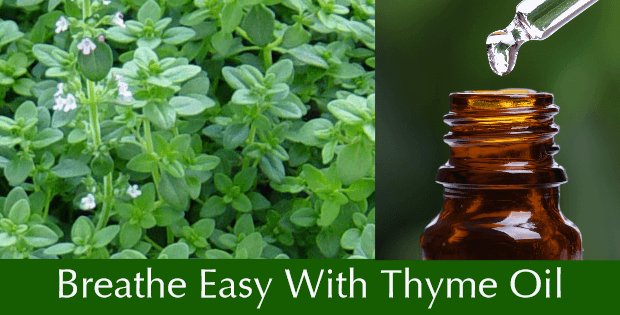Breathe Easy With Thyme Oil

A Powerful Antibiotic
That Balances Hormones
The benefits of thyme oil have been recognized for thousands of years in Mediterranean countries and in Ayurvedic medicine. Essential oils carry biologically active volatile compounds in a highly concentrated form that can provide therapeutic benefits in very small amounts. Essential oils are well absorbed into the body through the skin. To use essential oils therapeutically, add thyme oil or other essential oils to a carrier oil like coconut oil and rub on the various areas of the body being treated.
Thymol makes up 20 percent to more than 50 percent of thyme oil and gives thyme oil strong antimicrobial properties. Thyme’s essential oils include additional potent compounds including camphene, linalool, and carvacrol. Caryophyllene and camphene are powerful antiseptics that can protect wounds against infections. Due to its antimicrobial effects thymol is often used in mouthwash and in cosmetics as a preservative.
Thyme oil’s strong antibacterial properties were demonstrated in one study. A tincture made from thyme was more effective against the Propionibacterium acnes bacterium (causes acne) than tinctures made from marigold or myrrh. In addition, the thyme tincture had a stronger antibacterial effect than the common acne treatment benzoyl peroxide. Another study presented at the Society for General Microbiology, found that among the essential oils tested, cinnamon oil and thyme oil were found to be the most successful against various Staphylococcus species, including MRSA. Researchers said these treatments can be an alternative to antibiotic use and minimize the formation of new resistant strains of bacteria.
Full Spectrum Protection
Thyme oil has anti-fungal properties, and has been shown to be effective against candida albicans, which is a common cause of yeast infections. According to one study, thyme essential oil “significantly enhanced intracellular killing of C. albicans…” Thyme oil kills worms, including round worms, tape worms, maggots, and hook worms.
Thyme oil is an expectorant, and helps remove mucus from the airways and lungs. Thyme oil is approved by Germany’s Commission E in the treatment of bronchitis, whooping cough, and upper respiratory inflammation. Thyme oil has anti-spasmodic activity, relieving spasms and cramps. This is why it has traditionally been used to treat respiratory ailments and coughs. According to the American Botanical Council: “In vitro and in vivo studies show that thyme flavonoids relax tracheal and ileal smooth muscles.” Thyme oil helps relieve or cure coughs and can also help heal infections in your chest.
Wild thyme has been used to induce cell death in breast cancer cells. After 72 hours of treatment, thyme essential oil killed 98 percent of human breast cancer cells, with researchers concluding wild thyme “may be a promising candidate in the development of novel therapeutic drugs for breast cancer treatment.”
Research discussed in the Proceedings of the Society of Experimental Biology and Medicine discovered thyme essential oil has progesterone balancing effects. Thyme oil improves progesterone production and makes thyme oil an effective way to naturally balance out hormones. Combining thyme oil and clary sage oil is particularly effective for hormonal balance.
Clary sage oil helps balance out excess estrogen production in the body and is a very effective essential oil for a wide array of hormone imbalances. Many current health issues, including infertility, PCOS and estrogen-based cancers, are related to excess estrogen in the body — much of it due to consumption of foods with estrogenic effects due to hormones and pesticide residues.
Thyme is an emenagogue, it stimulates blood flow to the pelvic area and uterus and may stimulate menstruation. Thyme oil can be useful for irregular periods, premature menopause, and other menstrual problems. Thyme oil is also known to delay menopause and balances hormone levels. It relieves menopausal symptoms including mood swings, hot flashes and insomnia.
Thyme, a member of the mint family, and has a sweet, earthy flavor that lends itself well to cooking. Hippocrates, the “father of medicine,” counted thyme as a culinary herb, although it was also used as a form of medicine in ancient times, particularly for respiratory conditions. Thyme oil can stimulate your circulation, digestion, secretion of hormones, and your entire metabolism.
Be sure to use top grade therapeutic essential oils to experience all of the many health benefits of thyme oil. Thyme – (Premium) 100% Pure, Best Therapeutic Grade Essential Oil – 10ml is an excellent, fragrant thyme oil. (As an Amazon Associate I earn a small amount from qualifying purchases.)

See how to use thyme oil below!
How to Use Thyme Oil
Thyme essential oil is produced through the steam distillation of fresh leaves and flowers of the thyme plant. To make your own thyme oil, pick a handful of fresh thyme, wash the herb and pat it dry. Then crush the herb — you can do this using a mortar and pestle.
Once the leaves are crushed and the natural oils are released, add the crushed leaves and 1 cup of a carrier oil (like olive oil or coconut oil) to a saucepan over medium heat. Heat the mixture for 5 minutes, until you notice it bubbling. Once the mixture cools, it can be stored in a glass container that is kept in a cool place.
Here are some easy ways to use thyme oil in your everyday life:
§ To ease fatigue, add 2 drops of thyme oil to warm bath water.
§ To relieve menstrual cramps, rub 2 drops of thyme oil with equal parts carrier oil on your abdomen.
§ To use as a mouthwash, add 2 drops of thyme oil to water and gargle.
§ To open blocked nasal passages, inhale 2 drops of thyme oil, or add it to hot water for steam inhalation.
§ To help respiratory conditions and coughs, add 2 drops thyme oil to carrier oil and rub on chest
§ To kill toe fungus, add 5 drops of thyme oil to a warm foot bath.
§ To kill infections and rashes, rub 2 drops of thyme oil to the needed area.
§ To increase circulation, inhale or diffuse 2–3 drops of thyme oil daily.
THYME OIL RECIPES
Instead of using conventional recipes and showering your body in harmful chemicals, try adding thyme oil to this Homemade Bug Spray recipe. In addition to keeping away bugs, it also helps kill bacteria and nourish your skin! And unlike conventional brands, it smells great.
Thyme oil kills germs in the mouth and serves as a dental varnish. Try adding 10–20 drops of thyme oil to my Homemade Remineralizing Toothpaste. This recipe has all the nutrients that support building healthy teeth, from calcium to magnesium. Not only will your teeth be clean, but they’ll be healthy and strong too.
Thyme oil is known to stimulate hair growth, and it washes away germs and bacteria that may build up on the scalp. Add 10 drops of thyme oil to my Homemade Rosemary Mint Shampoo. You will fall in love with the invigorating fragrance! This all-natural and chemical-free shampoo helps thicken hair and reduce dandruff.
HORMONE BALANCE SERUM
INGREDIENTS:
§ 1 ounce evening primrose oil
§ 30 drops clary sage oil
§ 30 drops thyme oil
§ 30 drops ylang ylang oil
DIRECTIONS:
1. Mix all ingredients together in 2-ounce bottle
2. Put into glass vial with dropper.
3. Rub 5 drops onto neck 2 times daily.
POSSIBLE SIDE EFFECTS & INTERACTIONS OF THYME OIL
Thyme oil is safe for adults and children when consumed in normal food amounts and when taken as medication for short periods of time. A possible side effect is disrupting the digestive system; if you notice this, stop using thyme right away. If you are pregnant or breastfeeding, thyme oil is safe, but stick to food amounts because there is not a lot of research on the side effects at this time.
Thyme oil is most likely safe when applied to the skin, but there are some reports of skin irritations as a result of using thyme oil, so test the oil on a patch of skin first. People who are allergic to oregano or other Lamiaceae species might also be allergic to thyme.
Do not take thyme oil if you have a bleeding disorder; thyme might slow blood clotting, and taking thyme can increase your risk of bleeding, especially if used in large amounts. Because of this, you should also stop using thyme oil two weeks before a scheduled surgery. Thyme might also act like estrogen in the body, so if you have any condition that might be made worse by exposure to estrogen, don’t use thyme.
Thanks to Dr. Axe for these great recipes!